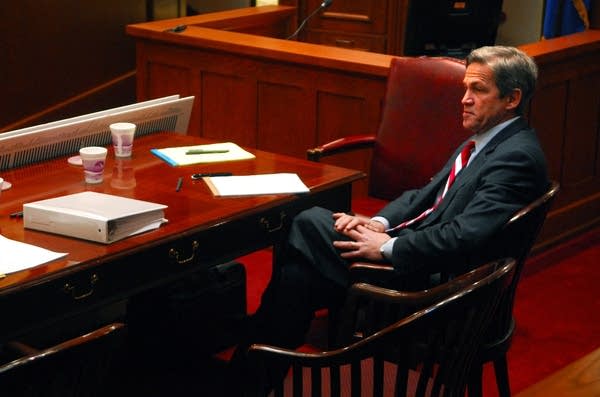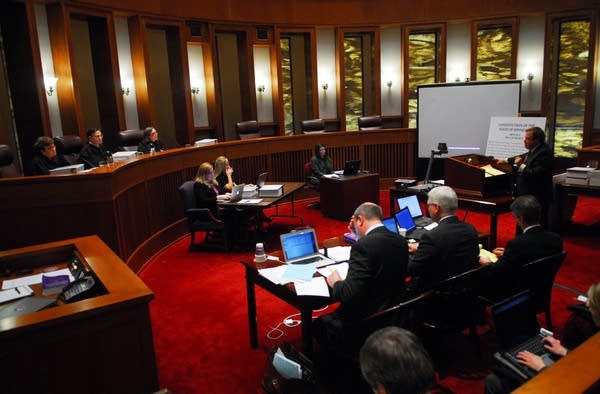Judges request Coleman team to resubmit evidence
Go Deeper.
Create an account or log in to save stories.
Like this?
Thanks for liking this story! We have added it to a list of your favorite stories.

During opening statements, Coleman's attorney Joe Friedberg told the three-judge panel that there were three major categories of ballots that the campaign wanted it to consider: wrongly-rejected absentee ballots, supposedly double-counted ballots and 133 missing ballots from a Minneapolis precinct.
Friedberg told the panel that the absentee ballot category is the main one and how they were counted controls the outcome of the case. He asked that the judges allow 5,000 wrongly-rejected absentee ballots to be included in the recount.

"We want Minnesota voters wherever possible to be enfranchised," Friedberg said. "They're entitled to that, especially when whether or not their vote counted varies from county to county depending on where they live. That's just not how we do business here."
Democrat Al Franken's attorney, Kevin Hamilton, told the judges that the Coleman campaign should not be able to overturn the canvassing board's decision that certified Franken as the top vote getter.
Turn Up Your Support
MPR News helps you turn down the noise and build shared understanding. Turn up your support for this public resource and keep trusted journalism accessible to all.
"That is a breathtaking step and should and does require breathtaking evidence," Hamilton said.
That evidence was supposed to take the form of copies of envelopes containing absentee ballots that the Coleman campaign received through data practice act queries. These were compiled into binders that held 400-500 pages, which everyone in the courtroom had in front of them. Unlike other court cases, where dramatic witnesses on the stand tell their compelling stories Perry Mason-style, this is a case where the ballots tell their stories.
Friedberg called witnesses, two campaign staffers who explained that the copies of the rejected absentee ballot envelopes looked the same as those the campaign received from the counties. Friedberg would go page by page and the witness would say which county the ballot was from and what name was on the envelope. This tedious work was expected to go on for days until Judge Denise Reilly asked about who put a handwritten, circled "A" on one of the copied ballots.

Coleman's witness, attorney Gloria Sonnen, answered that campaign staffers put their own marks on the copies, and while they were supposed to redact those before asking to put them into evidence, some of their comments were still present. In other places, they redacted more than their own notes.
"In redacting, some of the redactors got a little overzealous and took out more information, which is what opposing counsel from the Franken campaign has taken issue with," Sonnen said. "Some information did not get redacted out due to the time constraints."
Under rules of evidence, copies of documents can be entered into a case but they must be accurate copies of the originals. Any other marks need to be explained and Franken's attorneys objected numerous times. The three-judge panel took a recess and came back. Judge Kurt Marben spoke for the panel and agreed with the Franken's objections.
"And counsel, we're going to require the originals because it's not apparent to the panel that the witnesses can explain all the markings that are on these proposed exhibits and how they differ from the originals that were provided," Marben said.
Friedberg said the Coleman team never anticipated that the panel would make a final judgment on whether or not a specific absentee ballot would be opened and counted, based on a picture of it. He said he expected they'd be offered on the condition that the originals would come in later.

The panel stood by its ruling and said the Coleman legal team will have to subpoena the counties for the original 12,000 absentee ballots, of which they expect to use about 5,000. Those counties will send their original absentee ballots to the three-judge panel.
It's unclear how long that process will take but it's likely to delay the trial. The panel is scheduled to reconvene Tuesday at 9 a.m.
Dear reader,
Political debates with family or friends can get heated. But what if there was a way to handle them better?
You can learn how to have civil political conversations with our new e-book!
Download our free e-book, Talking Sense: Have Hard Political Conversations, Better, and learn how to talk without the tension.






